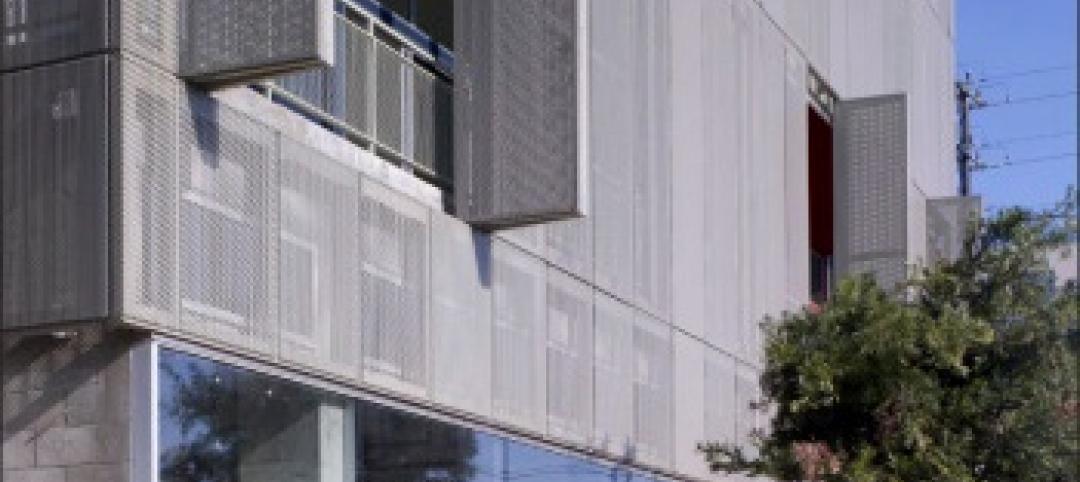The jury for the American Institute of Architects (AIA) Upjohn Research Initiative, a joint program of the College of Fellows and the Board Knowledge Committee to support knowledge sharing between practitioners and academicians, has announced the four projects selected to receive grants. The purpose of this grant, now in its ninth year, is to provide base funds for applied research projects that advance professional knowledge and practice. The 18-month long project grant qualifies recipients to have their findings and outcomes published both electronically and in a nationally distributed publication. The total award of $100,000 will be spread across the selected proposals. The four selected projects are listed below.
Auto-Shading Windows: Smart Thermobimetal Solar Blinds
Principal Investigator: Doris Sung, AIA (DOSU Studio Architecture)
With pressure from the outdoor environment such as swells in temperature, humidity, precipitation and demands from the interior to achieve variable comfort standards and evolving uses, buildings need to adjust automatically. By incorporating new, smart materials and creative assemblies, buildings now have the potential to modulate changes throughout the day. Smart materials require no added energy or computer controls. Thermobimetal is a smart material that automatically curls when heated and, when utilized strategically, can help liminal building surfaces automatically and optimally respond to temperature changes and direct sunlight. This proposal seeks funding to build a window prototype that will automatically block up to 90 percent of the sunlight entering a building while retaining a high level of visibility and view throughout the day. The net effect of this zero-energy system is energy and cost savings.
Building Resilience: A Tool for Planning & Decision-making
Principal Investigator: David Fannon, AIA (Northeastern University)
Recent events show the urgency of designing resilient new buildings and upgrading existing ones. However, it is not clear which combinations of attributes make buildings more likely to maintain useful function and adapt in the face of disturbances. Furthermore, buildings can be assessed based on the impacts from and contributions they make to the robustness, redundancy, resourcefulness and rapidity to recover of surrounding urban ecological systems. These are critical questions for architects, communities, and businesses, and yet there is very little information to guide decision-making about resilient building attributes. To meet this need, this project will develop a web-based tool to evaluate and compare multiple dimensions of resilience and sustainability in buildings, including technical and socio-ecological performance, energy use, and lifecycle impacts.
Clothesline Sunpower: PV Papeles
Principal Investigator: Kristina Yu, AIA (University of New Mexico; McCLAIN + YU Architecture & Design)
This proposal aims to demonstrate the design opportunities of the mobile installation of a new system of photovoltaics also known as solar panels. This investigation will examine the energy capture difference between the separate but related test project of the microelectronic photovoltaic (MEPV) taut mechanical shade system vs. this proposal’s novel design for a mobile simple install of a Clothesline Sunpower: PV Papeles MEPV system. The Clothesline Sunpower: PV Papeles MEPV system aims to capture sufficient to abundant energy to supply a home without the cumbersome and panelized PV panels which require extensive installation and space requirements. The MEPV technology affords a higher level of energy capture while providing a new tactility and versatile flexibility uncommon to PV systems today. The researchers aim to simplify the component pieces of the current MEPV taut shade and to create a functional temporary MEPV system that has the duality of ‘ease of install’ and ‘ease of use.’ Much like placing clothes on a line to dry in limited vertical spaces, the panels, with visual and high efficient variety, can be placed outside to collect the sunpower to harness and store within the interior space.
Point-of-Decision Design (PODD) to Support Healthy Behaviors in the College Campuses
Principal Investigators: Upali Nanda, Assoc. AIA, and Michelle Eichinger (Center for Advanced Design Research and Evaluation – CADRE/HKS; Designing4Health)
This research study aims to address the causes of weight gain, also known as obesogenic, in students on college campuses by answering the question: how can we make the healthy choice an easy choice through the design of critical point of decision prompts? The hypothesis is that well-designed point of decision prompts can promote healthier choices by students that can have a ripple effect on mental and physical health related to obesity. At each point of decision, design can help/hinder the healthier choice. There is a need to collate the vast information in planning and public health domains on a range of successful point of decision prompts and translate it into architectural guidelines that help define the edge condition for critical point of decision prompts. The researchers propose to develop a POD (point of decision) Design Guide and Analysis Tool.
Related Stories
| Apr 26, 2011
Video: Are China's ghost cities a bubble waiting to burst?
It's estimated that 10 new cities are being built in China every year, but many are virtually deserted. Retail space remains empty and hundreds of apartments are vacant, but the Chinese government is more concerned with maintaining economic growth—and building cities is one way of achieving that goal.
| Apr 25, 2011
Earn $300 million by NOT hiring Frank Gehry
An Iowa philanthropist and architecture aficionado—who wishes to remain anonymous—is offering a $300 million “reward” to any city anywhere in the world that’s brave enough to hire someone other than Frank Gehry to design its new art museum.
| Apr 20, 2011
Marketing firm Funtion: to host “Construct. Build. Evolve.”
Function:, an integrated marketing agency that specializes in reaching the architecture, building and design community, is hosting an interactive art event, “Construct. Build. Evolve.” in Atlanta’s Piedmont Park on Thursday April 21, 2011 at 11:00AM EDT. During the event attendees will be asked to answer the question, “how would you build the future?” to rouse dialogue and discover fresh ideas for the future of the built environment.
| Apr 20, 2011
Architecture Billings Index: new projects inquiry index up significantly from February
The American Institute of Architects (AIA) reported the March ABI score was 50.5, a negligible decrease from a reading of 50.6 the previous month. This score reflects a modest increase in demand for design services (any score above 50 indicates an increase in billings). The new projects inquiry index was 58.7, up significantly from a mark of 56.4 in February.
| Apr 19, 2011
What are the 15 most-watched construction and engineering stocks?
According to Motley Fool, a multimedia financial services company, the most-watched construction and engineering stock is Fluor (NYSE: FLR), which ranks #1 on BD+C’s Giants 300 engineering list with $1.994 billion in revenue in 2009. Check out the 14 other most-watched A/E stocks.
| Apr 19, 2011
AIA announces top 10 green Projects for 2011
The American Institute of Architects Committee on the Environment announced its Top 10 Green Projects for 2011. Among the winners: Cherokee Studios in Los Angeles, the Department of Energy's National Renewable Energy Laboratory in Golden, Colo., and the Vancouver Convention Centre West in Vancouver, British Columbia.
| Apr 18, 2011
Greening and Upgrading Today’s Vertical Transport Systems
Earn 1.0 AIA/CES HSW/SD learning units by studying this article and passing the online exam.
| Apr 14, 2011
U.S. embassies on a mission to green the world's buildings
The U.S. is putting greater emphasis on greening its worldwide portfolio of embassies. The U.S. State Department-affiliated League of Green Embassies already has 70 U.S. embassies undergoing efforts to reduce their environmental impact, and the organization plans to increase that number to more than 100 by the end of the year.
| Apr 14, 2011
How AEC Professionals Choose Windows and Doors
Window and door systems need to perform. Respondents to our annual window and door survey overwhelmingly reported that performance, weather resistance, durability, and quality were key reasons a particular window or door was specified.













